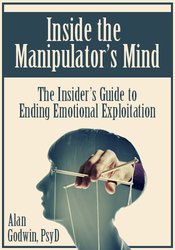Alan Godwin – Inside the Manipulator’s Mind
$109.00 $29.00
»Delivery: Within 7 days
Description
Alan Godwin – Inside the Manipulator’s Mind
Description of Inside the Manipulator’s Mind

Constructive Strategies for Countering Emotional Manipulation
From guilt trips to gaslighting, emotional manipulation takes many forms, and it’s often so covert that clients have difficulty articulating how and when it’s happening.
This recording explores the manipulator’s motivations for relating to others through drama, offering an in–depth analysis of the manipulation process. Discover effective strategies your clients can use immediately to recognize and counter manipulation in any setting while establishing healthy relational boundaries. Combining decades of clinical practice and the latest behavioral research, Dr. Alan Godwin offers comprehensive solutions you will be ready to use the next day to engage and empower your clients.
What you’ll learn in Inside the Manipulator’s Mind
Objectives
- Describe the manipulation process and examine common manipulative behaviors in clients
- Analyze the relationship between reasoning deficiencies and emotionally manipulative behavior in clients
- Articulate behavioral patterns characteristic of people who tend to be most susceptible to emotional manipulation
- Explain common responses to and risks of emotionally manipulative behavior
- Evaluate strategies clients can use to effectively counter manipulation in a variety of contexts
- Identify common limitations of manipulative relationships and relate to treatment outcomes
Outline
The Manipulator’s Mind
- Defining emotional manipulation
- Five reasoning deficiencies at the heart of emotional manipulation
- Humility
- Awareness
- Responsibility
- Empathy
- Reliability
- Drama, schemata, and overcompensation
- The master
- The martyr
- The messiah
- Methodologies of
- Grooming
- Manipulation
- Maintaining the toxic status quo
- Elements of manipulation associated with disordered and non-disordered individuals
- Behavioral variations according to context (business, family, romance)
- Short- and long-term psychological damage
- When attempts to manipulate don’t succeed
Manipulative Relationship Dynamics
- Healthy vs. manipulative relationships
- Characteristics of attraction, dependency, and role participation
- Codependency and addiction
- Commonly-exploited vulnerabilities
- Naïve expectations
- Unwarranted benefit of the doubt
- Attempting to reason with the unreasonable
- Who stays, who leaves, and why?
Countering Manipulation & Ending Destructive Cycles
- Discern the report’s accuracy
- Teach counterintuitive behavior
- Outline and recognize the manipulation process
- Understand the antagonist
- Disarm buttons
- Respond vs. react
- Set boundaries
- Lean on connections
- Acknowledge relational limitations
- Identify risk factors
- Minimize fallout
- Measure recovery
- Strategies for overcoming resistance to change
- Resources for ongoing support
EXAMPLES & APPLICATIONS
- Example #1: Set up to fail in the workplace
- Example #2: Love under lock and key
- Example #3: The guilt-tripping parent
- Example #4: The God’s-gift-to-the-world relative
About Alan Godwin
Alan Godwin, Psy.D., is a licensed psychologist in private practice with over 30 years of experience. Dr. Godwin has expertise in working with personality disordered clients and with clients who’ve been negatively impacted in close relationships with disordered people. Certified in Alternative Dispute Resolution, he has dedicated himself to helping individuals, couples, churches, and businesses develop better ways of handling conflict. In addition to his private practice, Dr. Godwin serves on the adjunct faculty of the Graduate Counseling Department of Trevecca University in Nashville, TN, where he teaches doctoral students and has also taught undergraduate students.
Additionally, he has penned a regular quarterly feature entitled “Ask Dr. Alan” for Deacon magazine, writes a weekly email called “The Drama Review: In Relationships and Culture,” and has been a guest on numerous radio and television programs across the U.S. and Canada. Dr. Godwin’s book, How to Solve Your People Problems: Dealing with Your Difficult Relationships, explains how and why conflict goes badly and how to make it go well with two types of people: those who are normally-wired and those who are personality disordered.
More courses from the same author: Alan Godwin
Delivery Policy
When will I receive my course?
You will receive a link to download your course immediately or within 1 to 21 days. It depends on the product you buy, so please read the short description of the product carefully before making a purchase.
How is my course delivered?
We share courses through Google Drive, so once your order is complete, you'll receive an invitation to view the course in your email.
To avoid any delay in delivery, please provide a Google mail and enter your email address correctly in the Checkout Page.
In case you submit a wrong email address, please contact us to resend the course to the correct email.
How do I check status of my order?
Please log in to HealingCourse account then go to Order Page. You will find all your orders includes number, date, status and total price.
If the status is Processing: Your course is being uploaded. Please be patient and wait for us to complete your order. If your order has multiple courses and one of them has not been updated with the download link, the status of the order is also Processing.
If the status is Completed: Your course is ready for immediate download. Click "VIEW" to view details and download the course.
Where can I find my course?
Once your order is complete, a link to download the course will automatically be sent to your email.
You can also get the download link by logging into your HealingCourse account then going to Downloads Page.
Related products
Total sold: 11
Total sold: 3









